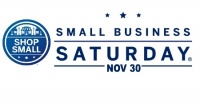 Rolling for Initiative is a weekly column by Scott Thorne, PhD, owner of Castle Perilous Games & Books in Carbondale, Illinois and instructor in marketing at Southeast Missouri State University. This week, Thorne shares his thoughts on Small Business Saturday.
Rolling for Initiative is a weekly column by Scott Thorne, PhD, owner of Castle Perilous Games & Books in Carbondale, Illinois and instructor in marketing at Southeast Missouri State University. This week, Thorne shares his thoughts on Small Business Saturday.Now we come into the holiday shopping season, the time of year when, depending on to whom you talk, retailers make 20 to 40 percent of their sales. Black Friday, Cyber Monday (a self-fulfilled event, if you look at the statistics) and for the last several years, Small Business Saturday, a creation of American Express.
Small Business Saturday is promoted by AmEx ostensibly to promote small businesses in the U.S., and, more practically, to encourage more small businesses to sign up to accept the American Express card. I say ostensibly to promote small business because any small business can register to participate in Small Business Saturday and receive a welcome package, including door stickers, floormat and shopping bags. However, in order to take advantage of the main thing driving customers into stores, a one-time $10 credit on their AmEx statement when they make a $10 or more purchase in a participating store, the store must accept the AmEx card. Since many stores in the U.S., especially small retailers, do not accept American Express, due to higher merchant fees than Visa or Master Card, or even Discover, charge, I would willingly bet that AmEx looks at the list of retailers participating in Small Business Saturday, compares it to the list of those that accept AmEx and contacts non-accepting retailers to pitch the card. Assuming that a store got a number of customers in attempting to use an AmEx card to get the discount, AmEx could point to that as a strong argument for taking the card.
While I really like the idea of Small Business Saturday (as I favor anything that has the potential to drive traffic into stores), I still have some caveats about the promotion, two to be precise:
- Placement. Putting Small Business Saturday on the Thanksgiving weekend, directly after Black Friday, really dilutes its impact. Given that Black Friday is the busiest shopping day of the year and the Saturday after Black Friday is typically the third busiest shopping day of the year (the Saturday before Christmas is the 2nd busiest shopping day of the year, just in case you were wondering), it appears quite difficult to measure the impact that SBS has. Given that so many people are out shopping anyway, how does a store determine what impact, if any, SBS promotion has on sales? Put the event on a Saturday in January, February or March, when you don't already have the holiday shopping season driving traffic into stores and see what effect it has then.
- Coattails. This is the fourth year for Small Business Saturday and American Express is still the only major company promoting it and, in fact, has the term trademarked. If SBS is to become an "organic" event, rather than a paid one, we need to see more companies taking advantage of or sponsoring it, rather than just AmEx. A quick search on Google shows only AmEx and Constant Contact running promotions tying into the event, while Wordstream has paid search tied to Small Business Saturday. In our industry, Alliance Distribution has come out with a FLGS Success Plan for Small Business Saturday, downloadable from the Alliance website, and offering stores the opportunity to win a $100 credit by submitting events and promotions tied to SBS for a drawing to take place in early December. Alliance, however, as far as I know, is the only company in the gaming (or comic) industry to really push SBS. While these promotions are good, Small Business Saturday needs more companies tying into the event to make it an actual "day" such as Black Friday, which developed on its own. I fear this won't happen so long as the day remains a trademark of AmEx.
Here's hoping I am wrong on these points, both that SBS will prove a major selling tool for stores and that more companies will start promoting it from both the front and back end. The store has registered for it again, so we shall see.
The opinions expressed in this column are solely those of the writer, and do not necessarily reflect the views of the editorial staff of ICv2.com.


